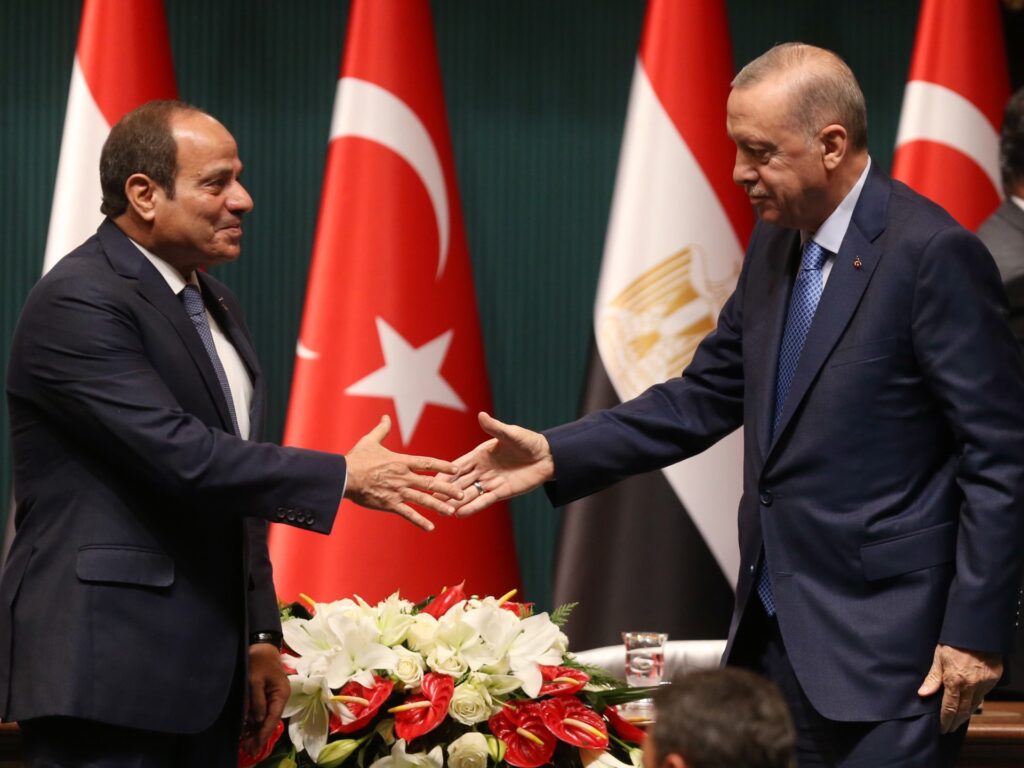6/9/2024–|Last update: 6/9/202410:39 PM (Makkah Time)
Israeli writer Tzavi Bar’el said, “Egypt’s fear of a permanent Israeli occupation of the Gaza Strip brings it closer to Turkey,” citing the first official visit of Egyptian President Abdel Fattah el-Sisi to Ankara.
In an article in Haaretz, Bar’el said, “Egypt is tired of Israeli criticism, the latest of which is the failure to prevent arms smuggling through the Rafah crossing and along the Philadelphi Corridor” (Salah al-Din).
The writer considered the Egyptian Foreign Ministry’s statement rejecting the Israeli accusations as “evidence of Egypt’s impatience, as the statement accused Prime Minister Benjamin Netanyahu of trying to thwart the prisoner swap deal and undermine the American-Egyptian-Qatari mediation by adopting an incitement discourse that would drag the region into escalation.”
Although this is not the first time that Cairo has rejected Israeli accusations, according to the writer, “the tone of the Foreign Ministry’s statement this time was sharper, and was consistent with US President Joe Biden’s skepticism about Netanyahu’s position on concluding a prisoner swap deal,” adding that Netanyahu “is trying to obscure his efforts to establish a permanent occupation of Gaza.”
Camp David
Bar’el pointed out that former officials and political commentators in Egypt believe that Israel is putting their country in a complex political and legal position that may push it to re-examine the Camp David Accords and the crossings agreement signed in 2005, in which Egypt decided to deploy 750 border guards on its side of the Philadelphi Corridor and both parties agreed that this arrangement does not violate those agreements.
Bar’el stated in his article that the Egyptian authorities “avoided talking about violating the Camp David Accords, but Cairo may be forced to make a decision under popular pressure if it becomes clear that Israel does not intend to withdraw its army from the Strip and that the size of the forces remaining there permanently, the number of tanks and armored vehicles, and the activity of the air force exceed what was stipulated in the agreements, and the whole matter may end up in the Security Council to discuss the Israeli violations.”
Aid
Bar’el believes that if Israel insists on occupying the Strip and does not reach an arrangement with Egypt, it will be forced to reopen the Rafah crossing, bear the burden of distributing the aid that enters through the Kerem Shalom crossing, and even finance the aid if the donor countries refuse to transfer more of it.
According to Barel, Israel “will need Egypt’s services as a partner in managing this sector, if only to organize the passage of patients and wounded and allow those who wish to leave for a country of asylum.”
“Egypt is fully awake and is creating new political channels to position itself in the region, as indicated by Sisi’s visit to Turkey after an 11-year rift, where he met with Turkish President Recep Tayyip Erdogan, whom he described as a friend. The two sides signed economic, technical and strategic agreements, in addition to forming a higher council for strategic coordination,” he added.
Bar’el concluded his article by saying, “Iran is seeking to resume its relations with Egypt, and resuming relations between them may not happen tomorrow, but talk about it is no longer theoretical. Israeli control over the Gaza Strip, which Egypt fears, would undermine the broad alliance that Washington is seeking to form against Iran in the region, and Egypt is one of its most important pillars.”

